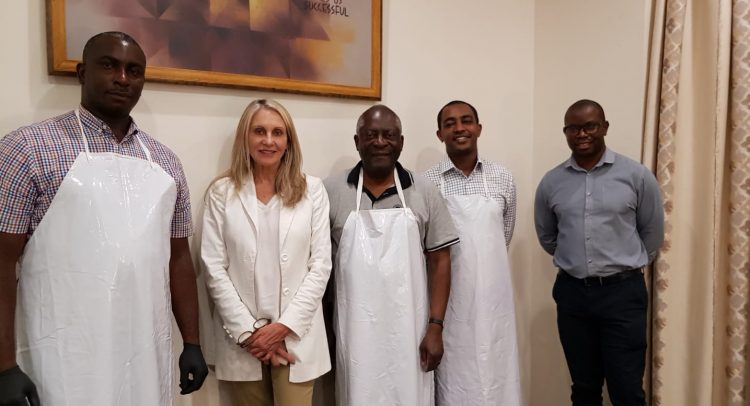The trainers and participants in a group photo.
Cardiologists from different African countries have benefited from a free training in Periop imaging and treatment of complicated Congenital Heart Diseases (CHD) and Rheumatic Heart Diseases (RHD) in Accra.
The surgeons from Nigeria, Ethiopia, and Angola were taken through a simulation exercise using a pig’s heart as a prototype to practice the innovative heart defect repairs in children.

The training follows an initial one organized by the African Cultural Institute and Pan African Society for Cardiothoracic Surgery (PASCaTS), for cardiologists from five African countries in heart valve repairs, a few months ago.
Professor Charles Yankah, cardiothorasic and vascular surgeon based in Germany and PASCaTS President, said the second training was a follow-up to the initial training which was a great success.
He said the aim of the training was to replicate the huge strides made in the developed world in surgical and interventional management of complex CHD, in Africa.
He therefore noted that the approach to collaborate with other African surgeons both home and in the Diaspora was to encourage innovative approaches to treating complex heart defects in children while expanding training centres of excellence on the Continent.
Co-trainer, Dr. Susanna Vosloo, female heart surgeon based in South Africa, interacting with Daily Guide after the training said, it is very expensive and difficult for Africa trained surgeons to gain experience in Europe and America, ‘so this is an Africa initiative to help each other in a much more effective and sustainable way.’
She said often, babies with complicated heart defects do not make it to the first year of life because apart from late diagnosis, most cardiologists are not confident enough to take up the challenge and therefore refer them to hospitals outside the country for treatment.
“If we can move away from only doing simple cases to doing a bit more complicated surgeries, we can save a lot of lives, she added.
Dr Vosloo therefore noted that the training is to build the base that will to eventually lead to cardiologists having the confidence to conduct complicated heart surgeries in children for better life expectancy.
“What we are doing is more sustainable than what they call the fly-in, fly-out health missions. Well, lots of people come organise health outreach and then do all the work and go away but they end up helping a few children that is very good but it does not make the people do it themselves.
Like the Bible says if you give a person a fish it is good but if you teach the person how to fish it is far better that is the principle of this approach which is also sustainable,” she added.
By Jamila Akweley Okertchiri


